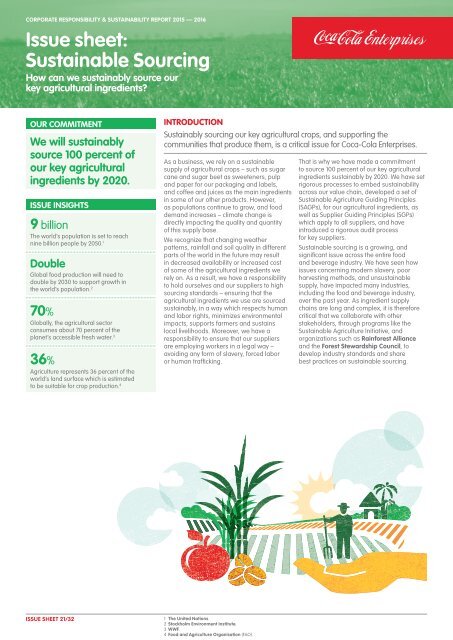Corporate Responsibility & Sustainability Report 2015/2016
1XlqBpD
1XlqBpD
You also want an ePaper? Increase the reach of your titles
YUMPU automatically turns print PDFs into web optimized ePapers that Google loves.
CORPORATE RESPONSIBILITY & SUSTAINABILITY REPORT <strong>2015</strong> — <strong>2016</strong><br />
Issue sheet:<br />
Sustainable Sourcing<br />
How can we sustainably source our<br />
key agricultural ingredients?<br />
OUR COMMITMENT<br />
We will sustainably<br />
source 100 percent of<br />
our key agricultural<br />
ingredients by 2020.<br />
ISSUE INSIGHTS<br />
9 billion<br />
The world’s population is set to reach<br />
nine billion people by 2050. 1<br />
Double<br />
Global food production will need to<br />
double by 2030 to support growth in<br />
the world’s population. 2<br />
70%<br />
Globally, the agricultural sector<br />
consumes about 70 percent of the<br />
planet’s accessible fresh water. 3<br />
36%<br />
Agriculture represents 36 percent of the<br />
world’s land surface which is estimated<br />
to be suitable for crop production. 4<br />
INTRODUCTION<br />
Sustainably sourcing our key agricultural crops, and supporting the<br />
communities that produce them, is a critical issue for Coca-Cola Enterprises.<br />
As a business, we rely on a sustainable<br />
supply of agricultural crops – such as sugar<br />
cane and sugar beet as sweeteners, pulp<br />
and paper for our packaging and labels,<br />
and coffee and juices as the main ingredients<br />
in some of our other products. However,<br />
as populations continue to grow, and food<br />
demand increases – climate change is<br />
directly impacting the quality and quantity<br />
of this supply base.<br />
We recognize that changing weather<br />
patterns, rainfall and soil quality in different<br />
parts of the world in the future may result<br />
in decreased availability or increased cost<br />
of some of the agricultural ingredients we<br />
rely on. As a result, we have a responsibility<br />
to hold ourselves and our suppliers to high<br />
sourcing standards – ensuring that the<br />
agricultural ingredients we use are sourced<br />
sustainably, in a way which respects human<br />
and labor rights, minimizes environmental<br />
impacts, supports farmers and sustains<br />
local livelihoods. Moreover, we have a<br />
responsibility to ensure that our suppliers<br />
are employing workers in a legal way –<br />
avoiding any form of slavery, forced labor<br />
or human trafficking.<br />
That is why we have made a commitment<br />
to source 100 percent of our key agricultural<br />
ingredients sustainably by 2020. We have set<br />
rigorous processes to embed sustainability<br />
across our value chain, developed a set of<br />
Sustainable Agriculture Guiding Principles<br />
(SAGPs), for our agricultural ingredients, as<br />
well as Supplier Guiding Principles (SGPs)<br />
which apply to all suppliers, and have<br />
introduced a rigorous audit process<br />
for key suppliers.<br />
Sustainable sourcing is a growing, and<br />
significant issue across the entire food<br />
and beverage industry. We have seen how<br />
issues concerning modern slavery, poor<br />
harvesting methods, and unsustainable<br />
supply, have impacted many industries,<br />
including the food and beverage industry,<br />
over the past year. As ingredient supply<br />
chains are long and complex, it is therefore<br />
critical that we collaborate with other<br />
stakeholders, through programs like the<br />
Sustainable Agriculture Initiative, and<br />
organizations such as Rainforest Alliance<br />
and the Forest Stewardship Council, to<br />
develop industry standards and share<br />
best practices on sustainable sourcing.<br />
ISSUE SHEET 21/32<br />
1 The United Nations.<br />
2 Stockholm Environment Institute.<br />
3 WWF.<br />
4 Food and Agriculture Organisation (FAO).


